Gain access to free Maryland state records today, physically and electronically, by following the steps explained in this brief resource.
State records and public information in Maryland includes criminal history, arrests, warrants, and mugshots. Court proceedings and vital records such as marriages, divorces, births, and deaths are available as well. The key is knowing who hosts each record type and how to best obtain them. Many are accessible online at no cost via the search tools provided below.
This streamlined article informs readers of state and federal public record laws and offers insights into offices and online lookup tools for finding the information you’re seeking — such as directories, websites, and databases. Track down important details about anybody in Maryland today.
Maryland State Records & Public Availability
The United States considers criminal records as public information.1 Many states use third-party aggregate sites to provide access for interested people.
Under the federal Freedom of Information Act (FOIA), ordinary citizens have the right to retrieve and inspect records barring any law restrictions. In most states, criminal records can be obtained by searching through trusted independent databases, visiting the state central repository, or consulting local law enforcement.
The most recommended method is third-party websites because they are the easiest to navigate. Many of these sites provide free searches, and interested parties can find all the information they need.1
Additionally, these parties are easy to navigate, and most of them have step-by-step instructions. Interested parties should look for reputable third-party aggregates, especially paid search services that will bring information to their doorstep.
The state of Maryland enacted the Public Information Act in 1970, granting a right of access to public records to interested members of the public. The PIA accounts for Maryland’s public agencies and officials, including all government branches (executive, judiciary, and legislature). According to the Maryland Public Information Act (MPIA), criminal records in the state are public records.
There are several categories of records available to the public in Maryland. They consist of:
- Vital Records (Marriage, Divorce, Birth & Death Certificates)
- Court Records
- Criminal Records
- Inmate Case Records
Though most records are available to the public, certain records are exempted from disclosure or privileged by law and, therefore, must be withheld. These records include but are not limited to:
- Financial information
- Personnel records
- Inmate case records under certain circumstances
- Medical records
- Attorney at Work products
- Records that contain attorney-client advice
Records that may be withheld include but are not limited to:
- Intra- and inter-agency memoranda and letters
- Investigatory records
The Maryland Attorney General’s Office provides a list of record custodians responsible for disbursing public records to the public. The interested party will have to fill out a PIA request form.10
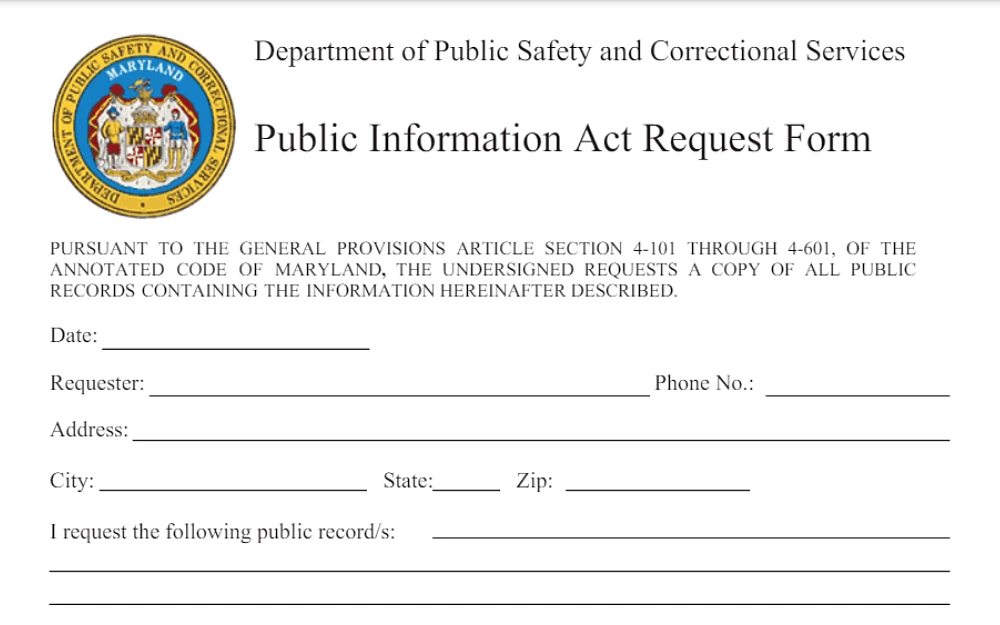
After filling out the form, they will submit the public record request to the responsible PIA representative. The List provided by the office of the Attorney General is updated periodically.
Maryland Criminal Records at a Glance
In the US, a criminal record is a document that contains criminal charges and their disposition, as well as records of arrest.2 According to the Maryland Department of Labor, a criminal record constitutes the following:
- A guilty verdict or plea
- An arrest
- The marking of a charge ‘stet’ on the docket (Inactive or put on hold indefinitely)
- A plea of nolo Contendere (accepting punishment but not accepting or denying charges)
- A disposition of not criminally responsible
- A disposition of probation before judgment
Initially, the government collated criminal records to supervise and track offenders leaving prison who were not executed or transported abroad. As time passed, this purpose became more refined to include judicial and policing purposes.
Criminal records aid police investigations and allow courts to review a person’s conviction and offending history. Currently, there are several non-governmental agencies, such as employers, that need to review criminal records.
The main repository of criminal records in Maryland is the (DPSCS). Interested parties can obtain these criminal records through:
- Online governmental registries (i.e., the sex offender’s registry)
- State criminal history repositories
- Local police stations
- Local courts
- Clerk of the court offices
- Third-party websites
How To View Criminal Records in MD
Since Maryland classifies criminal records as public records, they are accessible to anyone who wishes to view them. According to PIA, interested parties that can access Maryland state records include but are not limited to:
- Citizens
- Corporations
- Associations
- Private individuals
- Public interest groups
- Universities
How To Search Maryland Criminal Records via Public Databases
Maryland state records and public information can be accessed remotely.
The person requesting information about someone who has been charged with a crime should fill out the PIA record request form and submit it to the Maryland DPSCS.
The DPSCS contains the Criminal Justice Information Repository of Maryland. The standard fee for searching criminal records is $18. The interested party must adhere to strict requirements before obtaining the criminal records.
The party must submit a fingerprint record along with the fee before the process begins. If the requester lives in Maryland, he should first obtain the Maryland fingerprint card, Form 011, through a local police station. Alternatively, the party can get the fingerprint card by mailing a request form to:
CJIS-CR
PO Box 32708
Pikesville, Maryland 21282-2708
Phone: +1-888-795-0011 or 410-764-4501
Upon receiving the fingerprint card, the searcher should go to the local police station to be fingerprinted. Once this step is complete, the party ought to dispatch the fingerprint card and $18.00 to the CJIS address listed above.
Additionally, the party should make the money order or check payable to CJIS Central Repository. Once this step is complete, the criminal record will be sent by mail within 15 days.
To obtain criminal records of a third party, the requester must first provide the subject’s social security number, written consent, date of birth, full name, and a completed fingerprint card. Then the requester should fill out a government agency or private entity request form.11 Finally, they must submit the complete set of details to the record custodian.
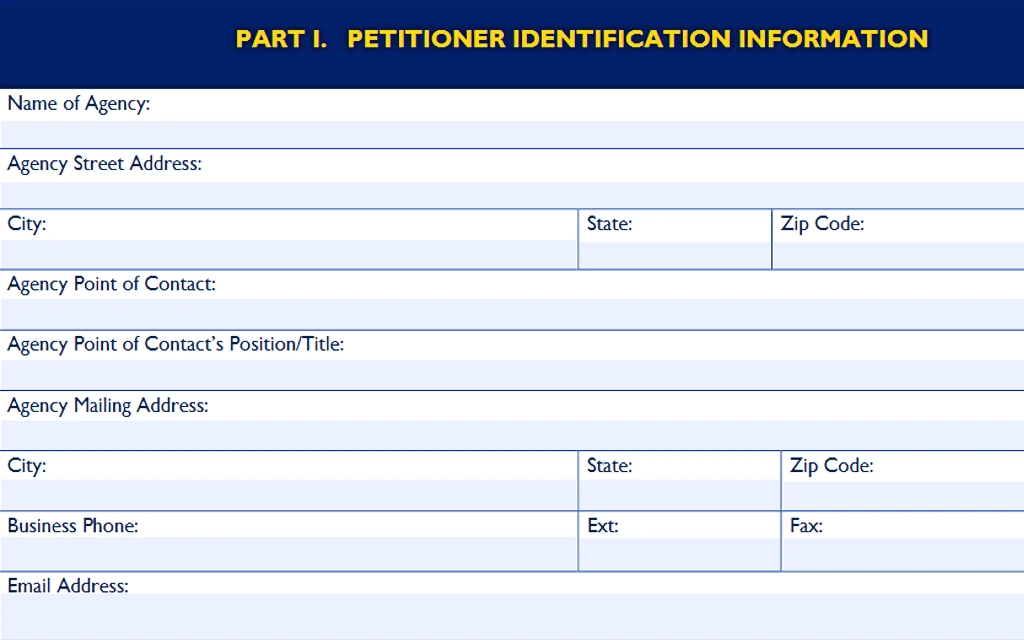
It is well to note that criminal records may contain certain inaccuracies. Sometimes, the departments may mix up records of people with similar names. If the interested party notices a mistake in their record, they should send a written notice straight to the courthouse where the record was created or filed.
The main drawback of obtaining criminal records through a fingerprint-based search is that it’s widely inaccessible. The interested party can request court records kept by the circuit court clerk in the court where the trial occurred.
Sometimes, the requester may obtain accurate information but notice that certain parts have been sealed by the court and withheld from public view. Individuals and agencies file motions to seal court records in some cases in the state.
A judge will have to give a verdict on the motion, and depending on conditions; there may be a need for conducting a hearing before the motion to seal is considered.
Once the motion to seal a record is given, the record is bound in an envelope that contains an official court seal. This record will only be retrieved under a specific court order. The sealed court record will not be displayed to prospective landlords and employers.
The state of Maryland allows the filing of a request for record expungement. For a criminal record to be expunged, the document is typically destroyed, and the criminal act recorded removed and forgotten.3 In Maryland, expungement does not necessarily translate to destroying a record or document. Instead, this record is hidden from public access.
Lastly, searchers can use a guide to Maryland arrests and criminal records to find more information on agencies that host criminal records, and a full list of MD law enforcement agencies and inmate rosters.
How To View Mugshots & Details of Maryland Arrests
In the US, public law enforcement agencies compile mugshots together with criminal investigation records when making an arrest. In essence, the police arrest individuals on suspicion that they are either planning to commit a crime or involved in one.
Even though not all arrests lead to a conviction or charge, the police keep arrest records (which include mugshots) for identification purposes. Arrest records are part of public records and, therefore, accessible to everyone.
An arrest record will include mugshots and other personal information, such as the subject’s:
- Full name
- Sex
- Date of birth
- Physical characteristics
- Charges
- Time of arrest
As such, to look for a mugshot, the interested party needs to obtain the arrest record. The Maryland State Police Department creates and maintains arrest records at the state level. At the same time, the county sheriff and police chief maintain the records at the local level.
The interested party can conduct an arrest search at one of the two levels. The search may be liable to a certain fee depending on the agency.
Who Can Access Juvenile Records in Maryland?
The DPSCS in Maryland states that court juvenile records and files remain confidential and should be withheld from inspection except by court order or provision of the law. The affected party has the right to request that the juvenile record be sealed or expunged.
Juvenile adjudications are generally not recognized as convictions. Therefore, juvenile records do not appear in a standard background check. Access to juvenile records is allowed chiefly to:
- Police
- Prosecutors
- Department of Juvenile Services
- Case managers
- Judges
- Juvenile court employees
Prospective landlords and employers generally do not access these records unless granted access by a court order. Anyone with a juvenile record can request a petition from the court to have them sealed or expunged to prevent any future access.
See Who’s Wanted in Maryland (Free Warrant Search)
Viewing Maryland state records and public information is straightforward due to the open records laws.
However, it gets a little challenging when it comes to checking if one has a criminal arrest warrant. The local law enforcement would not want the offending party to know they’re on the verge of being arrested. The suspected criminals may flee the state, conceal and destroy evidence, or harm and intimidate witnesses.
The court issues arrest warrants at the outset of a case. Generally, it’s challenging to search for arrest warrants and search warrants. The easiest to find is a bench warrant, which will exist if a citizen fails to attend a court date. A judge will release a warrant out for arrest when someone misses their court session.
The Maryland Rules of Procedure 16-1001 to 16-1011 grant the public access to most state records, including bench warrants.
The most appropriate place to search for outstanding arrest warrants is the Maryland Judiciary Case Search.12 The requester should select the ‘person’ option, agree to the terms and conditions, and conduct an exact name search.
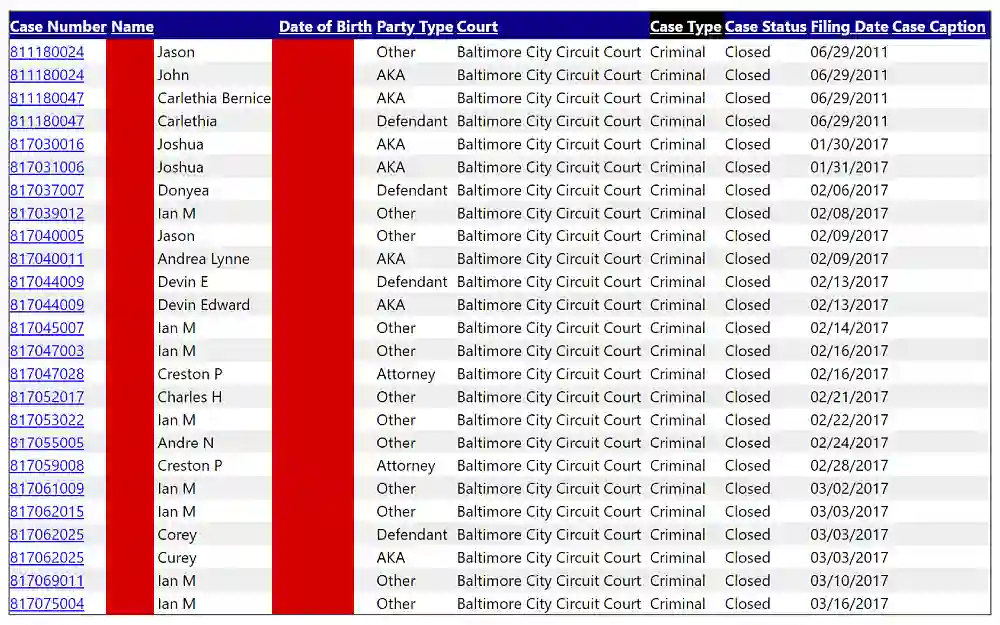
Alternatively, the interested party can find a criminal warrant for arrest through:
- Using a commercial site: Several third-party commercial websites provide a wide range of public records information. Most sites do not request identifying information such as social security numbers. However, it’s important to note that these sites are sometimes inaccurate.
- Contacting a court clerk: If the requester fails to obtain information from the official database and suspects that a commissioner or judge has issued an arrest warrant, then they should contact the court clerk directly. The requester can maintain anonymity by asking for any outstanding warrants under a specific name without disclosing their identity. The state’s official court directory provides contact information for all the courts in Maryland.13
- Working with a lawyer: If the requester suspects a warrant for their arrest, they should consider consulting a lawyer. The lawyer will contact the police department or the courthouse clerk without disclosing client information, protected by attorney/client privilege.
- Getting a third party to use the Court’s Public Access Terminal: Courts in Maryland have public access terminals that allow interested parties to search for court records. The courts do not conduct an identity check, but it’s prudent to send a third party to reduce the risk of being identified by a court official or police officer in case of an outstanding warrant.
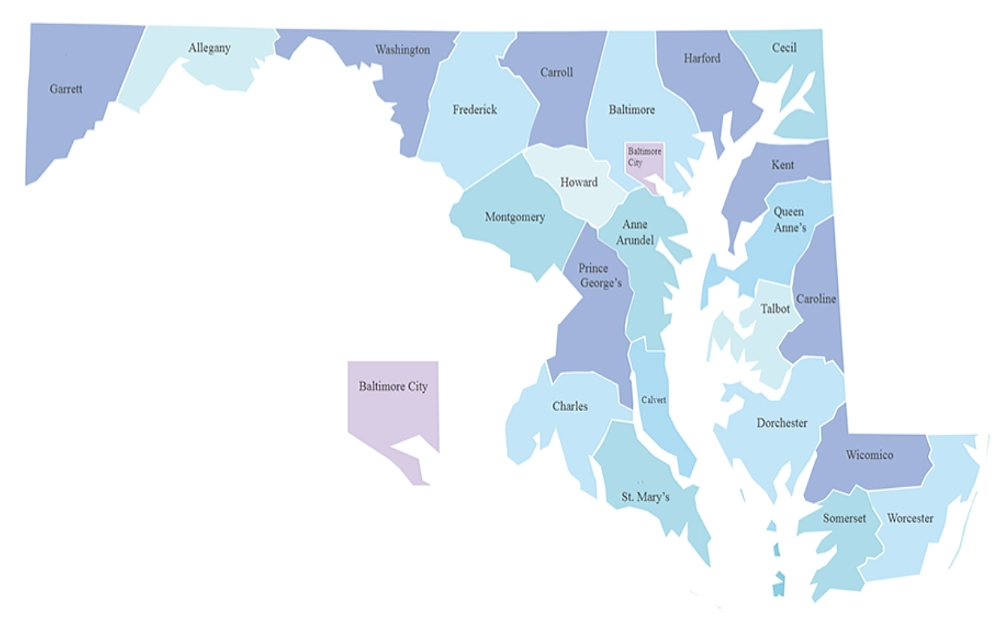
How To Check the Maryland Sex Offender Registry
The state of Maryland has a very comprehensive sex offenders registry website that is available to the public and easy to navigate.14 The Maryland Department of Public Safety & Correctional Services made the registry to help citizens protect themselves, their families, and their loved ones from people who have criminal sexual behaviors.4
This site allows interested parties to review registered sex offenders living and working near them and get notified of their movement. Additionally, the website provides resources that help requesters prevent and receive treatment for sexual abuse. The requesters can also call (410)-586-3600
An Overview of Maryland Background Checks
In Maryland, companies mainly carry out background checks during their hiring processes. Employers must adhere to federal and state laws, and the Fair Credit Reporting Act. The information that appears on a background check varies depending on the report.
In most cases, interested parties ask for educational, employment, and criminal information. The criminal history report will display the following:
- Date of arrest
- Case number
- Charges
- Date of disposition
- Disposition
- Sentence
The period covered by background checks ranges from 7 to 10 years. Information such as lawsuits, arrest records, civil judgments, collection accounts, or paid tax liens may be less than seven years old. Bankruptcy reports that are more than ten years old will not be reported.
Additionally, convictions, indictments, and arrest records that are more than seven years old will not be in the report.5 Credentials, employment, and education do not have a time limit.
Who Can Request a Background Check in MD?
Background checks are not categorized as public information. The information needed is protected by the Criminal Justice Information System-Central Repository (CJIS). Those who want access to this information need proper authorization.
In addition to the hiring process, background checks are conducted for a variety of reasons, such as acquiring firearms, changing residency, adoption applications, and security clearance for government organizations. Moreover, US citizens are allowed to conduct background checks on themselves for professional or personal reasons.
Furthermore, the Code of Maryland Annotated Regulation (COMAR) and the Maryland Security and Privacy Act protect the residents of Maryland from having background checks conducted on them without proper authorization.
How To Conduct a Maryland Background Check
Interested parties can find the information they need from the Maryland DPSCS, where the state criminal records central repository is maintained. To obtain a criminal history background check, the requester must submit a private petition packet and wait for approval from the DPSCS.
Once approved, the applicant must submit a filled fingerprint card to get the background check report. The report will only reveal the subject’s criminal history; it will not include information on employment, education, driving records, or other credentials.
Several websites provide free background checks. These free websites may offer outdated, inaccurate, and non-FCRA-compliant Information. Interested parties are advised to look for full-service, reputable, and FCRA-compliant background check providers.
The DPSCS charges an $18.00 fee for a background report. The requester will also have to pay $20.00 for fingerprinting. After getting approved for a private party petition package, the background report will take a10 to 15 days to arrive.
It’s possible to conduct a same-day state background check, though the condition needs to be extreme and verifiable. The requester must visit the Criminal Justice Information Services (CJIS) location in person and present valid documentation that can justify the request.
Criminal Justice Information Services
6776 Reistertown Rd. Suite 102
Baltimore MD 21215
Anyone can conduct a background check on themselves. There are two steps to the procedure. To request an Individual Review Background Check, fill out the CJIS 015 Form and send it to the CJIS – Central Repository with an $18.00 check or money order. Contact the FBI to perform a nationwide background check on yourself. “Stats and Services,” then “Background Checks,” are the two options.
Running Background Checks for Firearms
According to Federal law, firearm dealers licensed federally must conduct a background check on a buyer before selling a firearm. There are two options for conducting a firearm background check in Maryland.
The first option is to have the FBI conduct the check using their database, the National Instant Criminal Background Check System (NICS). This catalog does not always include state files.
Second, the dealers could use the state’s ‘point of contact,’ the Secretary of the Maryland State Police. A purchaser will have to fill out a state application form and then get processed through the Secretary who will review and verify the contents in this form.
One of the reasons that a secretary can disapprove of transfer is if an attending physician notifies them that the applicant suffers from a mental illness that makes them a danger to themselves or others. If the application is disapproved, then the secretary should notify the dealer within seven days of the application. Private dealers who are not licensed must conduct transfers through licensed dealers who can conduct background checks.
Maryland Tenant Screening
Most landlords want to review a person’s credit score, criminal history, and rental history. The best way is to pay a reputable third party to conduct the tenant screening. The landlord can run a national criminal background check or conduct a state criminal check following the procedure listed above.
Background Checks for Adoption or Foster Care
Maryland requires an adoption agency or foster parent home to conduct a criminal history record check before going through the process. The applicant is required to provide a complete set of legible fingerprints. The background check will involve:
- Reviewing local department records to look for indications of abuse or neglect
- Reviewing state and criminal background checks
Background Check for Security Clearance (Government Agency)
Some government agencies in Maryland require a background check to be submitted along with an application. The government has two methods of obtaining this background check.
- Getting Federal Results: The applicant can send their background card to the Maryland CJIS or directly to the FBI for federal processing.
- The applicant can obtain a state background check.
Limitations
In the US, background checks are mostly conducted by private and public employers to verify the criminal history of a job applicant.6 The employer is restricted by several laws on how to access and use the data gained during the hiring process.
First, employers are restricted from using an interviewee’s criminal past during the hiring process.7 In most cases, information on state-level arrests or convictions is withheld from the employer; thus, it cannot be used as a screening tool unless there is a statutory mandate or a court order.
Second, the State of Maryland enforces Ban the Box laws. These laws restrict managers from using an applicant’s criminal history before the initial interview.
Third, employers are not allowed to take into account records that are expunged, pardoned, or under seal. Applicants are not obligated to reveal the information on this record to employers. Maryland law does not allow employers to use these records to deny employment.
Lastly, if an employer wishes to examine the credit history of an applicant, first they must make a conditional offer to the applicant. Second, they cannot rescind this offer based on the information they obtain, and lastly, they must provide a valid reason for requiring the report. This reason must be closely connected to the job.
Court Records & the Maryland Judiciary System
The judiciary system in Maryland provides resolutions for all matters that involve civil and criminal laws. All judicial decisions are based on common law, statutory law, and equity. The court system in Maryland has four tiers, namely:
- District Court of Maryland: This court has branches throughout the state: in Baltimore City and every county. The court has limited jurisdiction presiding over minor civil and criminal matters.
- Circuit courts: These courts are found in Baltimore City and every county in the state. The courts preside over situations involving significant criminal and civil charges. Citizens are granted the right to appeal from district courts The judges in these courts are either elected or appointed by the governor.
- Court of Special Appeals: This is an appellate court and the state’s second-highest court. It oversees the resolution of cases that require appellate jurisdiction. The court has thirteen judges whom the Governor appoints with the Senate’s approval.
- Court of Appeals: This is the highest court in the state. It reviews important cases and bases its decisions on constitutionally interpreting the law. The judges serve seven-year terms. These judges are also appointed by the governor with the senate’s approval.
Besides the four courts, there is the orphan’s court that specializes in estates, wills, and other probate matters regarding aspects of guardianship. The judiciary also has various offices and agencies to manage the judicial process and aid the judges in the courts. One such aid is preserving court records, which include:
- Information
- Documents
- Items connected to the case
How To Look Up Someone’s Court Records or Case in Maryland
All courthouses in Maryland have their own court records. Public members have the right to access these records and are permitted to view them at the clerk’s office physically. The requester will need to know the case number or the names of the people involved with the case to help locate the file.
Moreover, interested parties can get a copy of the documents at a standard fee. The interested party should first call the courthouse to confirm the record’s availability. The court directory provides a list of court phone numbers and locations.
Maryland’s judicial system also provides electronic access to court records.8 The Maryland Judiciary Search is the best way to look for court records online.
The case search will provide a summary of the information contained in the case file. The requester can obtain general information such as type of case, case number, dates, etc. However, they will have to visit the clerk’s office to get the complete file.
Maryland Electronic courts also permit users to access court records on cases in which they are a part. This platform is mainly used by lawyers. Members of the public are subjected to specific rules.
The court may keep certain information in a case record private, limiting public access. Maryland courts allow expungement of records if they meet the required conditions. Those convicted of crimes from a specified list can request shielding of criminal records from the court.
Where Can I See if Someone Has Filed for Bankruptcy?
A debtor files for bankruptcy for various reasons, some of the most common include:
- Medical expenses
- Unemployment
- Overextending consumer credit
- Marital problems: Divorce or separation
To put the divorce statistics into perspective, the following image is based on data from the U.S. Census Bureau showing the percentage of people divorced in Maryland counties:
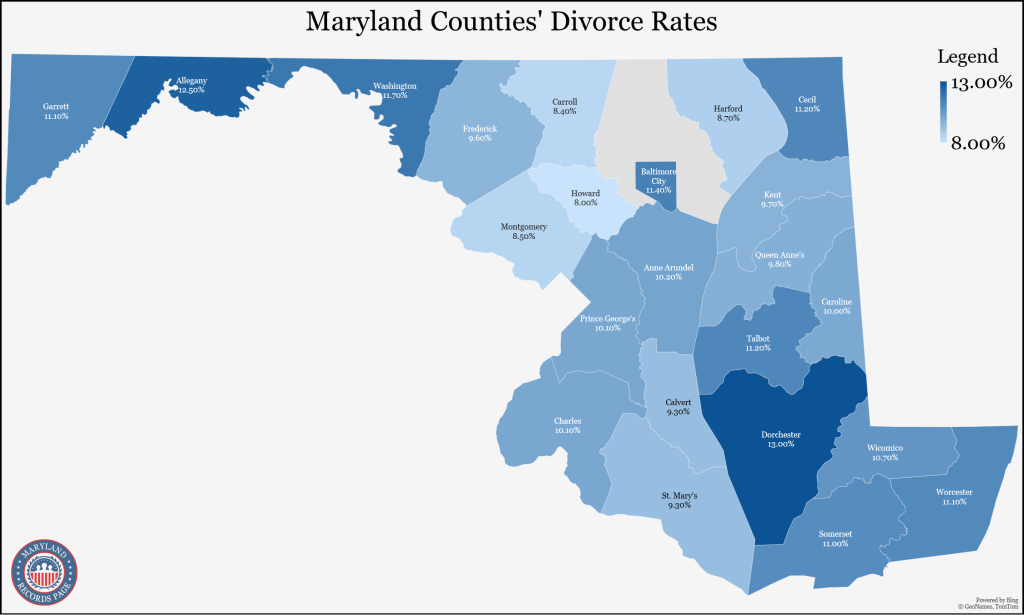
Bankruptcy discharges the debt, and the debtor’s assets are sold to pay creditors. Alternatively, the court may create a payment plan that allows debtors to manage the debt based on income and finances.
Filing for bankruptcy is not a light decision, but some people do it to get out of debt. Sometimes, it’s important to find out if someone has filed for bankruptcy. This information is important for anyone who wants to recruit a potential business partner, invest in a business, or loan money to someone.
Bankruptcy information is considered a public record in the US. The most recommended search method is using the Public Access to Court Electronic Records (PACER).14
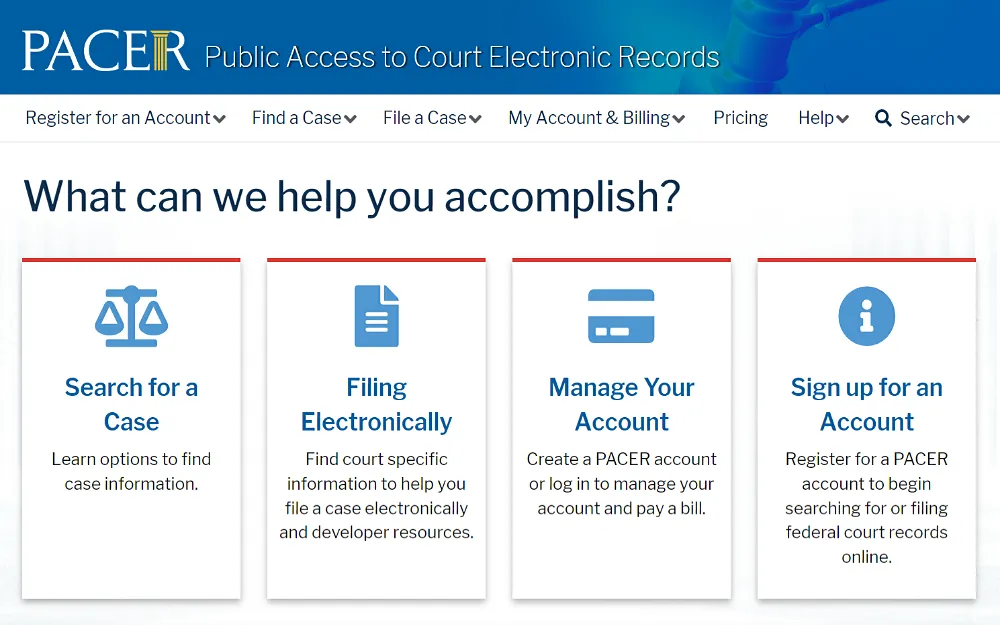
The United States District Court system created this resource to help the public access court records online.
This search tool requires an account to locate bankruptcy court cases and charges a fee for the records. The online search tool also requires a compatible device and a stable internet connection.
The requester can also fill out a copy work request and present it to the Courthouse Clerk’s office. This office provides exemplified or certified bankruptcy records and will inform the requester of the necessary costs.
The requester can call a toll-free number connected to an automated system with the required information. The interested party can access closed bankruptcy cases through the National Archives.
All About Maryland Inmate Records
The sheriff’s department in the DPSCS oversees the 18 prisons and pre-release centers distributed over the 23 counties in the state.
The Department of Juvenile Services manages 12 juvenile detention facilities. Maryland has one federal prison camp and one federal prison under the Federal Bureau of Prisons’ Mid-Atlantic Regional Office.
All offenders booked, detained, or incarcerated in Maryland correctional facilities has an inmate record created, managed, and stored by the offices of the DPSCS. Inmate records contain details such as:
- Date of birth
- Gender, sex, and race
- Hair and eye color
- The date of incarceration
- Case file number and booking number
- Current location and status
In compliance with the PIA, inmate records have been made available to the public. Requesters can obtain these records from traditional government agencies or third-party websites and organizations.
How To Gain Insights About Jail Inmates in Maryland
Manually looking for a single prisoner in the 24-state jails may be tiresome but not impossible. If someone wants to know how to find jail paperwork, conduct a prison background check, or visit an inmate in jail, then they should visit the government’s official site.
The DPSCS operates an inmate lookup tool that the interested party can use to search for inmates in any state prison. The inmate locator provides information on the housing locations of those currently living at the division of correction facilities, Patuxent Institution, and Pretrial and Detention service facilities (short-sentenced offenders).15
The requester needs to fill out the subject’s first and last name. If the name is shared, the requester can add personal information such as physical description (hair and eye color), date of incarceration, etc. The locator also provides the inmate’s mugshot and other additional information to help with verification.
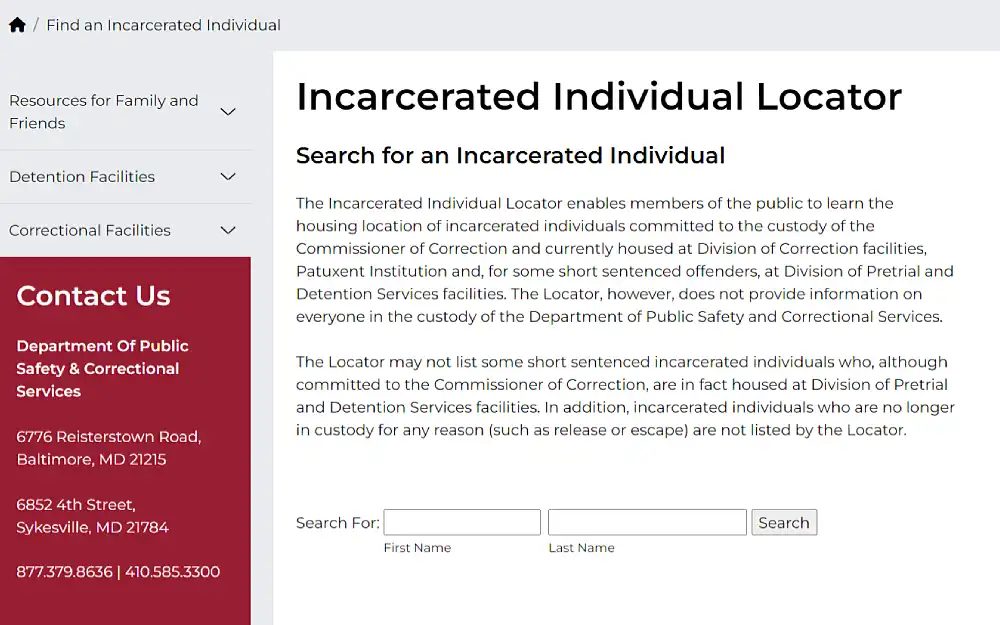
A third-party website works just the same. The requester will need to provide the name of the subject. Additionally, the requester might need to provide a rough region location such as the state, county, or city.
The DPSCS also allows public members to send money to an inmate through the lockbox service.
How To Look Up Details of Inmates in MD State or Federal Prisons
The best place to find a prisoner in a federal prison or camp is by visiting the Federal Bureau of Investigation (FBI) website. This website has an FBI prisoner locator that performs a search using either name or number.
The requester can search by name by providing the correct names of the subjects along with specific personal information.9 The number search is more precise, and the requester needs to provide the number on the FBI prisoner ID of the inmate.
If the requester wishes to search for inmates in county jails, they need to look for the sheriff’s department of that specific county. This department manages inmate records; all of them have online jail rosters and inmate lists that they update regularly.
References
1Blankley, K. M. (2004). Are public records too public-why personally-identifying information should be removed from both online and print versions of court documents? Ohio St. LJ, 65, 413s <https://kb.osu.edu/bitstream/handle/1811/70965/1/OSLJ_V65N2_0413.pdf>
2Mukamal, D. A., & Samuels, P. N. (2002). Statutory limitations on civil rights of people with criminal records. Fordham Urb. LJ, 30, 1501. <https://ir.lawnet.fordham.edu/cgi/viewcontent.cgi?article=1873&context=ulj>
3Murray, B. M. (2016). A new era for expungement law reform-recent developments at the state and federal levels. Harv. L. & Pol’y Rev., 10, 361. <https://harvardlpr.com/wp-content/uploads/sites/20/2016/06/10.2_4_Murray.pdf>
4Fundack, A. (2019). Maryland Sex Offender Registry and Sex Offender Recidivism: Time Series Correlational Study (Doctoral dissertation, Walden University). <https://scholarworks.waldenu.edu/cgi/viewcontent.cgi?article=8420&context=dissertations>
5Henry, J. S., & Jacobs, J. B. (2007). Ban the box to promote ex-offender employment. Criminology & Pub. Pol’y, 6, 755. <https://www.nelp.org/wp-content/uploads/2015/03/Henry-Jacobs.BantheBox.article.Oct-07.pdf>
6Duane, M., La Vigne, N., Lynch, M., & Reimal, E. (2017). Criminal background checks. Urban Institute. Justice Policy Center. (Last Accessed Date: 24 May 2017). <https://www.urban.org/sites/default/files/publication/88621/2001174_criminal_background_checks_impact_on_employment_and_recidivism_2.pdf>
7Larson, R., Shannon, S., Sojourner, A., & Uggen, C. (2022). Felon history and change in US employment rates. Social Science Research, 103, 102649. <http://users.soc.umn.edu/~uggen/Larson_Shannon_Sojourner_Uggen_SSR_21.pdf>
8Guffin, P. J. (2020). Digital court records access, social justice, and judicial balancing: what Judge Coffin can teach us. Me. L. Rev., 72, 87. <https://digitalcommons.mainelaw.maine.edu/cgi/viewcontent.cgi?article=1727&context=mlr>
9Bronson, J., & Carson, E. A. (2019). Prisoners in 2017. Age, 500, 400. <https://oarklibrary.com/file/2/b5be9936-86b0-4b6b-b684-7076b32477cf/908c852a-0da4-4b88-b728-dad73450ab36.pdf>
10Department of Public Safety and Correctional Services. (n.d.). Public Information Act Request Form. Retrieved June 2, 2023, from <https://www.dpscs.state.md.us/publicinfo/pdfs/PIA_Request_Form.pdf>
11State of Maryland, Department of Public Safety and Correctional Services. (2020, May 1). Application to Receive State of Maryland History Record Information for Private Party Petition. Retrieved June 2, 2023, from <https://www.dpscs.state.md.us/publicservs/pdfs/FORM-%20ITCD-74%20Private%20Party%20Petition-%2005012020.pdf>
12Maryland Judiciary. (2023). Maryland Judiciary Case Search Criteria. Retrieved June 2, 2023, from <https://casesearch.courts.state.md.us/casesearch/>
13Maryland Judiciary. (2023). Directory of Appellate, Circuit, District and Orphans’ Courts. Retrieved June 2, 2023, from <https://www.courts.state.md.us/courtsdirectory>
14Public Access to Court Electronic Records. (n.d.). PACER: Federal Court Records. Retrieved April 30, 2024, from <https://pacer.uscourts.gov/>
15Maryland Department of Public Safety and Correctional Services. (2023). Inmate Locator. Search for an Existing Offender. Retrieved June 2, 2023, from <https://dpscs.maryland.gov/services/inmate-locator.shtml>
